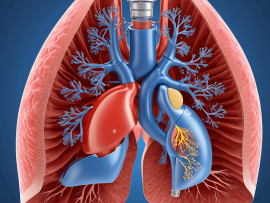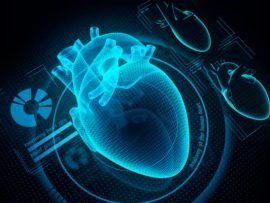Abstract This review traces the evolution of centrifugal blood pumps in mechanical circulatory support (MCS) systems. Initially met with concerns over blood damage and thrombus formation, centrifugal pumps have become..
Lee masAbstract Background The identification, triage, and management of cardiogenic shock (CS) are complex and resource intensive, particularly given the recent surge in the use of temporary mechanical circulatory support (tMCS)..
Lee masAbstract Cardiogenic shock (CS) is a state of critical end-organ hypoperfusion caused by primary cardiac failure, in which the heart cannot generate sufficient output despite adequate preload and is associated..
Lee masAbstract Objective To discuss technical strategies and considerations to facilitate intraoperative extracorporeal membrane oxygenation (ECMO) management during lung transplantation. Methods We review our institutional approach to the management of intraoperative..
Lee masAbstract OBJECTIVES In cardiac surgery patients, acute kidney injury (AKI) frequently occurs in the setting of haemodynamic instability and treatment with temporary mechanical circulatory support (tMCS). Recent evidence suggests amino..
Lee masAbstract While iterative developments have improved outcomes of patients with myocardial infarction, mortality in patients with acute myocardial infarction cardiogenic shock (AMI-CS) remains stubbornly high. Several promising treatments have ultimately..
Lee masAbstract Cardiogenic shock (CS) in acute myocardial infarction (AMI) is a life-threatening syndrome characterized by systemic hypoperfusion that can quickly progress to multiorgan failure and death. Various devices and configurations..
Lee masAbstract Background Clinical evidence regarding predictors of successful weaning from mechanical circulatory support (MCS) is lacking. This study aimed to create a simple risk score to predict successful weaning from..
Lee masAbstract Background Among patients reliant on continuous-flow (CF) mechanical circulatory support devices, bleeding is primarily caused by an acquired von Willebrand factor (vWF) deficiency, precipitated by the high shear stress..
Lee masAbstract Background There remains significant variability in the use of intraoperative mechanical circulatory support in lung transplantation. This report details our outcomes using elective cardiopulmonary bypass (CPB) in lung transplantation...
Lee masOverview SCAI’s eBook on Mechanical Circulatory Support (MCS) provides an in-depth, structured approach to understanding cardiogenic shock and the use of MCS devices. Organized into five sections, the eBook covers..
Lee masAbstract Cardiogenic shock represents a critical condition in which the heart is unable to maintain adequate circulation leading to insufficient tissue perfusion and end-organ failure. Temporary mechanical circulatory support offers..
Lee masAbstract In recent years, there has been an increased utilization of temporary mechanical circulatory support (tMCS) in patients with cardiogenic shock (CS), with many transitioning to recovery or advanced therapies..
Lee masAbstract Cardiogenic shock is a complex and diverse pathological condition characterized by reduced myocardial contractility. The goal of treatment of cardiogenic shock is to improve abnormal hemodynamics and maintain adequate..
Lee masAbstract Up to 50% of patients with pulmonary embolism (PE) experience hemodynamic instability and approximately 70% of patients who die of PE experience an accelerated cascade of symptoms within the..
Lee masAbstract The use of temporary mechanical circulatory support (tMCS) in cardiogenic shock patients has increased during the last decades with most management strategies relying on observational studies and expert opinion,..
Lee masAbstract Cardiogenic shock (CS) is a highly complex clinical condition that requires a management strategy focused on early resolution of the underlying cause and the provision of circulatory support. In..
Lee masAbstract THE 2023 International Society for Heart and Lung Transplantation (ISHLT) guidelines for mechanical circulatory support (MCS) supersede the 2013 guidelines published a decade ago, incorporating substantial developments in device technology and..
Lee masAbstract Type 1 cardiorenal syndrome is associated with significant excess morbidity and mortality in patients with severe acute decompensated heart failure. Previous trials of vasoactive drugs and ultrafiltration have not..
Lee masAbstract Heart failure (HF) is a frequent and severe condition. It is estimated that one in four patients will die within a year following hospitalization for acute decompensation, with significant..
Lee masAbstract We sought to develop and validate a new risk stratification score for mortality for children supported with a ventricular assist device (VAD). This retrospective, multicenter study used data from..
Lee masAbstract The use of mechanical circulatory support using percutaneous ventricular assist devices (pVAD) has increased rapidly during the last decade without substantial new evidence for their effect on outcome. In..
Lee masAbstract An increasing number of devices can provide mechanical circulatory support (MCS) to patients with acute hemodynamic compromise and chronic end-stage heart failure. These devices work by different pumping mechanisms,..
Lee masAbstract There has been a significant increase in the use of short-term percutaneous ventricular assist devices (pVADs) as acute circulatory support in cardiogenic shock and to provide haemodynamic support during..
Lee masAbstract DESPITE MEDICAL ADVANCEMENTS, mortality in cardiogenic shock (CS) remains unacceptably high.The decreased cardiac output resulting in impaired oxygen delivery characteristic of CS triggers a dismal cascade culminating in tissue..
Lee masAbstract Mechanical circulatory support (MCS) plays a significant role as a therapeutic option for severe heart failure, and its outcomes have been improving due to advancements in devices and management..
Lee masAbstract Purpose of review To examine the evolving landscape of cardiac surgery, focusing on the increasing complexity of patients and the role of mechanical circulatory support (MCS) in managing perioperative..
Lee masAbstract Introduction Mortality rates in cardiogenic shock remain high, especially in patients with SCAI shock stages C to E [1].When hemodynamic status does not improve or worsens despite optimal fluid,..
Lee masAbstract The utilization of temporary mechanical circulatory support (tMCS) has increased significantly over the last 40 years for stabilization of salvageable patients; however, there has not been much improvement in..
Lee masAbstract BACKGROUND The effects of temporary mechanical circulatory support with a microaxial flow pump on mortality among patients with ST-segment elevation myocardial infarction (STEMI) complicated by cardiogenic shock remains unclear...
Lee mas














